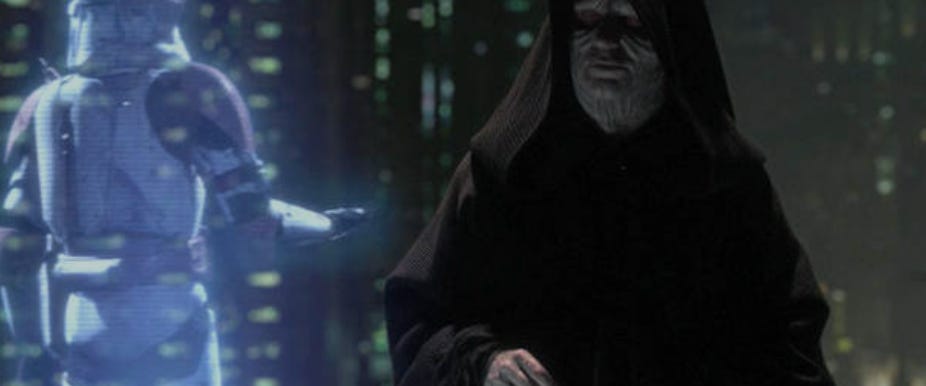The Shadow of Rome in Star Wars (Article)
A comparison of Star Wars and Roman history.
Author’s Note: I want to give a shout-out to
for getting me to write this article. Here’s a fun fact about me: I got my undergraduate degree in History and Political Science. So I’m glad I can finally make use of my college education.It’s fashionable to compare everything to Ancient Rome, and I mean everything. So much ink had been spilled comparing America to the Roman Empire; so many historical narratives had been crafted around the Eternal City and her empire. Ancient Rome simply captures our imagination. And why shouldn’t it? There, one can find tales of war, political intrigue, and tragedy.
This brings me to Star Wars. From Jedi Knights to World War II-style dogfights, it’s clear that George Lucas had various historical inspirations in crafting his space opera. But what about Ancient Rome?
From Republic to Empire
Let’s get the obvious out of the way first. Just like Ancient Roman history, Star Wars saw the passing of a “Republic” into an “Empire”. But the comparison is more than skin deep.
Star Wars gave us Senator (later Emperor) Palpatine of Naboo, a charismatic figure who outright manipulated various events to his favor. For example, he manufactured the Naboo Crisis to make himself the Supreme Chancellor of the Republic. Years later when the Clone Wars broke out, he used the crisis as an excuse to hold on to power which culminated in the establishment of the First Galactic Empire. He also controlled both sides of the conflict.
In a sense, Palpatine is very similar to Augustus, the first Roman Emperor (no Patrick, Julius Caesar was not an emperor). Of course, Augustus lacked Palpatine’s Dark Side abilities, so he did not outright control political events. But what Augustus was able to do was to use various events to advance his political agenda. When Mark Antony, a political rival, divorced his Roman wife and married Queen Cleopatra of Egypt, Augustus used this opportunity to finally move against him. After all, Antony had made himself unpopular with the Roman public. It also helped that the woman Antony divorced was Augustus’ sister, making Augustus seem like a good brother trying to avenge his sister’s honor.
Speaking of family, this is something that Palpatine lacked. That’s probably why his Galactic Empire died with him (Expanded Universe aside) while the Roman Empire lasted centuries, if not millennia (depending on who you ask) after Augustus kicked the bucket.
Also, Augustus was much more respectful towards the old order, simply calling himself First Citizen instead of King. Palpatine was much more in your face about his Galactic Empire, and he ended up suffering the same fate as Augustus’ great uncle Julius Caesar - betrayed and murdered by someone close to him.
Speaking of the old order, let us dial back a little bit.
The Clone Wars, AKA Marian Reforms in Space?
As any halfway knowledgeable Star Wars nerd might know, the Clone Wars serves as the point of no return for the Galactic Republic. But why is that? It is true that war, especially one that doesn’t seem to have an end in sight, can exert tremendous pressure on a country. But there’s more to this than war weariness.
War can also force a country to reevaluate its approach to the military. For the Romans, the various wars they had undertaken (and threats of them) led to the Marian Reforms. These are a series of military reforms said to have been made by Gaius Marius at 107 BC. To summarize, the reforms turned the Roman legions from a militia-based unit made up of propertied men doing their civic duty to a professional military made up of poor men who enlisted into the service to make a living.
Thanks to the Marian Reforms, the Roman legions became the war machine that it is popularly known for. But at what cost?
That same question can be raised for the Clone Army in Star Wars, known officially as the Grand Army of the Republic. Taken from the genetic template of the bounty hunter Jango Fett, the clones of Kamino were trained from birth to fight a war. Deadly and obedient, they are the ultimate soldiers. When the Clone Wars broke out, the Galactic Republic had little choice but to make use of the clones to counter the Droid Army of the Separatists.
But at what cost?
Prior to the Clone Wars, the Republic did not have a standing army. Each planet was responsible for its own military. We also see large multiplanetary organizations like the Trade Federation with its own army. The closest thing the Republic had to an army were the Jedi Knights. But powerful though an individual Jedi might be, the Order as a whole did not have the numbers to fight a large scale and protracted war.
Both the Marian Reforms and the Clone Army had irrevocably changed their respective republics. For Rome, the reforms made the soldiers more loyal to their own generals, paving the way for the civil wars that would ultimately tear apart the Roman Republic. On the other hand, the Clone Army in Star Wars had a similarly devastating effect, but in an opposite way. During the Clone Wars, the Jedi had served as the generals of the clones. And yet, these clones turned out to be the downfall of the Jedi.
The Proscription of the Jedi
This brings me to the infamous Order 66, also called the ‘Great Jedi Purge’. But a word that best describes the fate of the Jedi Order is proscription.
To summarize, proscription is a process in which someone was declared to be an “enemy of the state”. From then on, that person was to be killed, and his property taken by the state. In Rome, proscription was first used by Sulla to eliminate his wealthy political opponents (which numbered in the hundreds if not thousands). Decades later, Augustus and Mark Antony (who were still allies at the time) would use proscriptions not just to eliminate their political opponents, but also to get some money.
What is Order 66 if not Palpatine’s proscription of the Jedi Order? First, the Jedi was declared to be the enemy of the Republic after their failed attempt to arrest the Chancellor. They were then betrayed by their own clone soldiers, the men they had fought with for years. Meanwhile, their home (the Jedi Temple) was attacked by the Clone Army in the dead of the night. With every Jedi to be killed, we can assume that the Empire took for itself any Jedi property from bank accounts to whatever artifacts were stored in the temple.
Just as proscriptions by Sulla and Augustus contributed to the end of the Roman Republic, Palpatine’s proscription of the Jedi Order removed the Old Republic and brought forth the Galactic Empire.
Conclusion
Whether it be the politics, the military, or even the tragedy of Order 66, the shadow of Rome can be found all over Star Wars. Was George Lucas consciously thinking about the Roman Empire when he was writing the Star Wars movies? I don’t know enough to say for sure. But I do know that if you are in any way affected by Western Civilization, then some bits of Ancient Rome are probably living rent free in your head right now.
Closing Words
Once again, I would like to thank Andrew for his encouragement in our correspondence through e-mail and Substack Notes. Be sure to check out his Substack publication, Goatfury Writes:
Also, if Andrew wants to give his own take on this subject in his Substack, I’ll be sure to take a look.
References
https://www.britannica.com/topic/proscription
https://u.osu.edu/marduburn/
https://www.worldhistory.org/article/1598/marian-reforms/
My memory










Good essay, glad Andrew convinced you. He has convinced me to write some essays too, I just have to get around to writing them 😂
On the comparisons. As you point out Lucas appears to have been influenced from everywhere. The most common is Weimar Germany but that's recency bias. Thinking of how the Republic operates in the prequel trilogy seems closer to the Holy Roman Empire or a medieval kingdom with barons/dukes (senators) petitioning the emperor/king (Supreme Chancellor) to solve disputes that they don't want to take to the courts. The Trade Federation's blockade of Naboo is questionable in legality yet Valorum wants to set up a committee and investigate it before ruling either way, which would be odd for a centralised state but reasonable for a decentralised one. Each system (county/principality/dukedom) is its own country held together by treaties on trade rights, amount of ships, size of ships, limitations on weaponry and size of military (the Trade Federation found loopholes to circumvent many laws and agreements). It seems wars between systems aren't immediately quashed or bureaucratic legalism steps in everytime. I don't know enough Expanded Universe stories to know and the wiki is a rabbithole I don't want to get sucked into right now.
There's a lethargy to the Republic that Palpatine takes advantage of and he fits the role of a Caesar figure but instead of focussing on the masses he convinces the senators themselves to support him. More of a Napoleon than a Julius, perhaps.
Definitely more to write about on this 😁
References:
- My memory.
- It came to me in a dream.
I am so glad this came together! I may well do a take on the Rome/Star Wars connection at some point.
Meantime, let's figure some other things out to nerd out about! Well done.